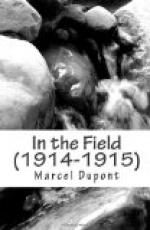I left them to go on with their game, and went in search of my comrade O. I found him in the middle of his troop, talking amicably with his men. After the enemy had ceased firing he had sent a party of sappers to dig the graves of the two non-commissioned officers who had fallen in the wood. We retired into a corner of the trench, and there he told me of the grief he felt at this loss, a grief he was doing his best to hide, so as not to injure the moral of his troop. Lagaraldi had just got his promotion, and was a soldier of the highest promise; Durand was the model corporal, clean, cheerful, and active. And, even if they had been but mediocre troopers, I knew too well what we officers feel when we lose even a passable Chasseur, to wonder at the melancholy of my charming young comrade.
Time went on, and there were no signs of a fresh attack. The enemy’s artillery seemed to be neglecting us, and to be bent upon the destruction of the Boesinghe bridge, by which we had crossed the Yser. His great shells flew over our heads with a sinister roar, and a few seconds later we heard the explosion far behind us. The German trenches in front of us were silent. A single shot fired at intervals alone reminded us that they were not forsaken.
“Mon Lieutenant, it’s all ready.”
A corporal had come out of the wood to tell O. that the graves were dug. When we had sent word to our chiefs, and placed our non-commissioned officers in temporary command, our strange, sad procession of mourners left the trenches and slipped through the thicket in single file. There were four officers, the Lieutenant-Colonel, Major B., O., and myself and four non-commissioned officers. It would have been dangerous to deplete the firing line further.
With heavy hearts we retraced our steps through the wood we had so lately passed through in all the exaltation of our advance. We knew the moral anguish we were about to feel in rendering this last service to our young brothers-in-arms. It was unhappily by no means the first time we had held such a ceremony, but never had I been present at one in such tragic circumstances, nor in such impressive surroundings. We hurried along, almost running in our anxiety to return quickly to our men. The branches caught at us and slashed our faces, the dead leaves and twigs crackled under our tread. Above us the shells still sang their funeral song.
We had now come in sight of the burial-ground. In the moonlight, at the edge of the wood close to the spot where our gallant fellows had fallen, we could distinguish newly-dug earth, and four silent men standing beside it, their tunics thrown off, leaning on spade and pickaxe. It was there.
In a little ravaged garden-plot, at the foot of great trees which would guard these graves, they had dug two holes, which, by night, looked extraordinarily deep and dark.




